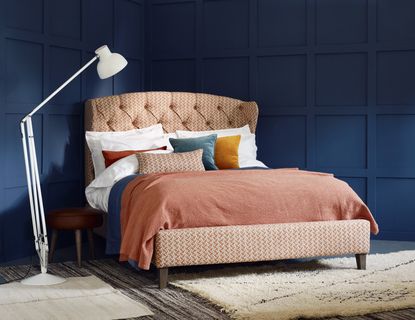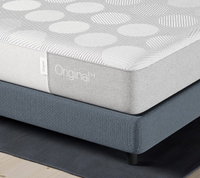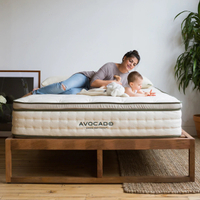How to choose the right mattress for the best night's rest possible
Choosing the right mattress will guarantee a better night's sleep. These experts explain the key factors that should inform your decision


Choosing the best mattress for your needs is key to a proper night's sleep, but it's still the part of our bedding that most of us fail to give proper thought to. True, this integral component of our bed contributes nothing from an aesthetic perspective, but there's no way we could sleep without it. This is why you should think long and hard before choosing which mattress is right for you.
The fact is, mattresses don't come cheap, but they should last at least seven years. While this should mean that we're willing to invest in the most supportive option for our sleeping habits, many of us often end up sacrificing quality for affordability, bypassing any consideration for our individual needs at all. But since we spend almost a third of our lives in bed, we really ought to spare a thought to our mattresses.
That said, with so many different mattress types available, all of which rate differently on the mattress firmness scale (yes, that's a thing), knowing where to start can be overwhelming. Since your mattress is the last thing you want to be losing sleep over, we've compiled some expert advice from those in the know to help you decide which mattress is best for you.

Lilith is an expert at following news and trends across the world of interior design. She's committed to helping readers make the best choices in their homes through sharing practical tips and guides that make life more comfortable. For this piece, she spoke with sleep and mattress experts for their advice on how to choose the right mattress for a blissful night's rest.
How to choose the right mattress
1. Consider your sleeping position

When choosing the right mattress, your first thought might be the type, but your sleeping position (and other sleeping habits) should really inform all other decisions.
'People have different requirements based on size, shape, weight, sleeping positions and so on - it’s impossible to approach mattress buying with a one-size-fits-all mindset,' explains Adam Black, co-founder and mattress expert at Button & Sprung.
The bottom line is, your mattress should comfortably support your weight so that all your bones are properly aligned. In turn, this will help you to sleep better. As Adam notes: 'A good, comfortable mattress will gently support the whole body and provide postural alignment by keeping the spine in a neutral position.'
For example, if you sleep on your back your weight is more evenly distributed, so a medium to firm mattress will be best. If you're a side sleeper, your hips and shoulders bear a lot of pressure, so you might prefer a mattress on the softer side to suit the contours of your body.
Your personal shape and size will invariably play into this, though. For lighter weight sleepers a soft mattress will be suitable but for a heavier weighted person, they're unlikely to be getting enough support. Consider all this different factors before you commit to a mattress.

Original Hybrid Mattress, from Casper
Get multi-zoned support to help align your spine with this hybrid mattress from Casper. It has comforting foam to help to relieve your body from pressure as well as springs to prevent sinking. A truly luxurious night's sleep.
2. Choose a firmness that's right for you

We've already touched on firmness ratings, but they really deserve their own mention. Once you've considered all your personal sleeping habits, you can start thinking about how firm your mattress is. While this will in part come down to personal preference, health should be the priority.
'To find the right mattress for you it’s worth testing a range of options with varying firmness and noticing if it supports your body, meaning that your spine’s natural curve is supported and your head, shoulders, lower back and feet are aligned,' says Jonathan Warren, director and mattress specialist at Time4Sleep. 'As mentioned, this will differ depending on your weight and body shape.'
According to Jonathan, the most popular and reliable form of mattress for all types of sleepers is a medium to firm one, like the Emma Premium mattress. 'This is because medium-firm mattresses are ideal for sleepers who tend to sleep in a variety of sleep positions, whether that be on your side or back for example, as they provide a mix of both support and softness,' he says.
3. Weigh up the different mattress types

It doesn't end there, either. The firmness of your mattress will inevitably be influenced by the type you go for. Memory foam, pocket sprung, latex, hybrid, you've probably heard them all - but which should you choose?
'At Button & Sprung we believe that a naturally filled, pocket sprung mattress is the best option on the market for offering comfort and support, plus they can be broken down and recycled accordingly at the end of their lives,' says Adam.
Jonathan is in agreement. 'Pocket sprung mattresses tend to be the highest quality, containing individual springs in small pockets that will move independently to provide you with optimum support based on your sleeping position,' he says.
There's been a lot of hype around memory foam mattresses in the past, but there are pros and cons worth a mentions. While their dense material offers lots of warmth and reduces the overall pressure on the body by contouring to you, they're not a sustainable choice. 'Foam is also made from chemicals (petro-carbons), which are not only bad for the environment, but also proven to be carcinogenic,' says Adam.
You’ll also want to consider the material of the mattress and how this could affect body temperature. Recently, there's been a shift towards organic mattresses with natural fillings such as silk, wool, hemp, cashmere and mohair.
'Natural materials like these are also heat regulators, ensuring you feel cooler in the summer and warmer in the winter,' adds Adam. 'Not only does this lead to better temperature regulation at night, it also means you sleep on a chemical free, more sustainable and more environmentally friendly bed than foam based alternatives.'

Avocado Green natural mattress
Sleep easy knowing your mattress is sustainable with this organic latex, wool and cotton option from Avocado green. The medium-firm mattress has no polyester, polyurethane foams, or toxic fire retardants to harm you either.
Should I use a mattress topper?
Mattress toppers are a great option for the Goldilocks among us who either find our mattress too soft or too firm and struggle to find something in between. You can also by foam mattress toppers if you want the extra comfort of memory foam without committing an entirely foam mattress.
'They can also extend the life of your mattress by reducing the pressure on the springs to provide you with longer-term support whilst you snooze,' adds Jonathan.
Be The First To Know
The Livingetc newsletter is your shortcut to the now and the next in home design. Subscribe today to receive a stunning free 200-page book of the best homes from around the world.

Lilith Hudson is the News Editor at Livingetc, and an expert at decoding trends and reporting on them as they happen. Writing news, features, and explainers for our digital platform, she's the go-to person for all the latest micro-trends, interior hacks, and color inspiration you need in your home. Lilith discovered a love for lifestyle journalism during her BA in English and Philosophy at the University of Nottingham where she spent more time writing for her student magazine than she did studying. After graduating, she decided to take things a step further and now holds an MA in Magazine Journalism from City, University of London, with previous experience at the Saturday Times Magazine, Evening Standard, DJ Mag, and The Simple Things Magazine. At weekends you'll find her renovating a tiny one-up, one-down annex next to her Dad's holiday cottage in the Derbyshire dales where she applies all the latest design ideas she's picked up through the week.
-
 5 Trees You Should Prune in Your Backyard in February — 'It Makes Much Sense to Cut These Ones Back Now'
5 Trees You Should Prune in Your Backyard in February — 'It Makes Much Sense to Cut These Ones Back Now'If you think pruning trees is best left to spring, think again. These trees all could use some cutting back now for several very important reasons
By Hugh Metcalf Published
-
 The 4 Things People With Really Organized Kitchen Drawers Always Have
The 4 Things People With Really Organized Kitchen Drawers Always HaveLevel up your ‘drawer decor’ and keep things tidy and organized with these 4 essential ideas for uncluttered storage
By Becca Cullum-Green Published

